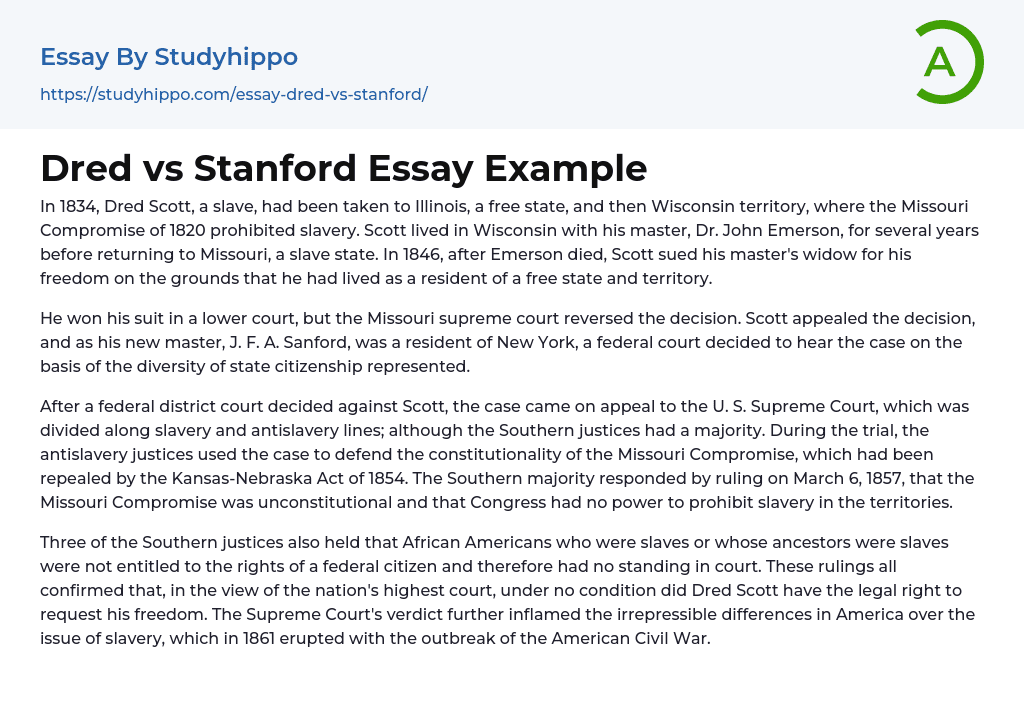In 1834, Dred Scott, a slave, was taken to Illinois - a state that had abolished slavery. He was subsequently moved to the Wisconsin territory where slavery was banned under the Missouri Compromise of 1820. For a number of years, he lived in Wisconsin with his owner, Dr. John Emerson before relocating back to Missouri - an area still allowing slavery. Following Emerson's demise in 1846, Scott initiated legal proceedings against his late master's widow seeking emancipation due to his previous residence in both free territory and state.
In the first court round, Scott was victorious in his legal conflict. However, the Missouri Supreme Court reversed this initial victory. Facing this reversal and considering that his new proprietor, J.F.A. Sanford lived in New York, a federal court opted to handle the case because it involved parties from different states.
style="text-align: justify">
After losing at a federal district court, Scott's legal dispute was escalated to the Supreme Court of the United States. This case exposed a divide within the court that mirrored the existing gulf between advocates for and against slavery. Many justices, primarily from southern states, were in favor of slavery. Those who opposed it used this lawsuit as an opportunity to argue for maintaining the validity of the Missouri Compromise—a law nullified by the Kansas-Nebraska Act in 1854—under legal terms. However, on March 6, 1857, with its majority being southern judges, the court ruled that according to the Missouri Compromise Congress didn't have constitutional authority to prohibit slavery throughout U.S territories.
Southern justices argued that African Americans, either directly or through their ancestors' experiences of slavery, were not accorded the privilege
of a national citizen. Hence, they lacked legal standing in court. This viewpoint was substantiated by the Supreme Court's ruling which declared that Dred Scott had no lawful grounds to claim his freedom under any situation. Consequently, this verdict exacerbated enduring conflicts over slavery in America, ultimately sparking off the American Civil War in 1861.
- Federal government essays
- Armed Forces essays
- Confederate States Of America essays
- Federal Government Of The United States essays
- Fourteenth Amendment To The United States Constitution essays
- Governance essays
- Parliament essays
- Politics essays
- Jurisdiction essays
- Bureaucracy essays
- Separation Of Powers essays
- Congress essays
- President essays
- United States Congress essays
- Non-Commissioned Officer essays
- Appeal essays
- Revenge essays
- Corporate Governance essays
- Public Service essays
- Income Tax essays
- Supply essays
- Red Cross essays
- Democracy essays
- State essays
- Liberty essays
- Absolutism essays
- Reform essays
- Republic essays
- John Marshall essays
- Bourgeoisie essays
- Developed Country essays
- Elections essays
- International Relations essays
- Left-Wing Politics essays
- Monarchy essays
- Political Corruption essays
- Political Party essays
- Political Science essays
- Sovereign State essays
- United Nations essays
- World Trade Organization essays
- Contras essays
- Dictatorship essays
- Foreign policy essays
- Monarch essays
- Corruption essays
- Foreign essays
- Democratic Party essays
- European Union essays
- President Of The United States essays




